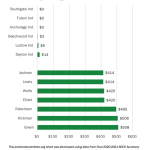Equity is about providing varied resources to respond to varied student needs, making sure all students have what they need to learn. Kentucky school transportation ought to be a great example. Instead, transportation is a major equity problem.
Transportation can be fairly simple and inexpensive in compact independent districts many students live close to their schools and many can walk or take short rides. In contrast, rural students at the far ends of their counties need buses that travel much greater distances. Districts should have funding that varies in keeping with those differences.
In statute, the SEEK formula should provide exactly that. Annually the Department of Education does calculate transportation costs for each district. For 2021, those calculations added up to a little over $389 million.
But $215 million is all the state budget for 2021 provided for those needs.
That’s the first part of an equity problem. Resources are not being committed where we know resources are needed.
But there’s a second part to this equity problem.
A state aiming to treat students in all districts fairly could handle that gap in resources by taking a similar amount from each student in each district. If the losses were distributed equally, each district would be down $297 per student.
Kentucky does not share losses that way. Instead That means the district with the biggest need takes the biggest loss. In recent 2020-21 funding, some districts lost less than $20 per student, while others took cuts of more than $400. Here’s a chart of the smallest and largest of those reductions.

Short of that best solution, a fairly simple statutory amendment could make the process much more equitable. If funding shortfalls cannot be avoided, they could be allocated on a per pupil basis, reducing each district’s total state seek funding by the same amount per pupil in average daily attendance. That simple change would not remove the damage done by underfunding transportation, but it would share the damage far more fairly among all students. It would especially improve equity for students in the mostly rural districts that have the greatest costs to transport students to school.
This problem can be best solved by fully funding transportation. That full funding is part of the Prichard Committee’s Big Bold Ask, and we think it’s an important item to fund.
The reductions happen that way because KRS 157.430 directs the Commissioner of Education to address funding insufficiencies by “a percentage reduction in the allotments to reduce the total of these allotments to funds available.”
An amendment like that would also apply when a Governor orders mid-year SEEK reductions because of a state revenue problem. That kind of reduction has also landed unequally under current law. For example, in 2012, the state reduced base SEEK allotments by a bit more than $42 million. Anchorage lost $34 per student while Owsley County lost $101. If the losses had been shared equally among the state’s students, that could have been $71 per pupil everywhere. The losses would still have been painful, but the pain would have been born equally by students in every district.
Kentucky must ensure that all students have what they need to learn. That’s what equity means, and our transportation funding needs to work for equity along with all our other education investments.
If you’d like to see the impact on your own district, check out this chart. It shows what each district needed for the 2021 fiscal year (as calculated by the Department) and what it received (also as calculated by the Department). Then it shows the missing amount as a total, and as an amount per pupil (using the average daily attendance plus growth count used for the SEEK base guarantee). Only, please don’t settle for looking only at what’s happening to learners in your own community. Notice what’s being taken from communities nearby and far away, because students in all those places are part of our commonwealth.





Comments are closed.